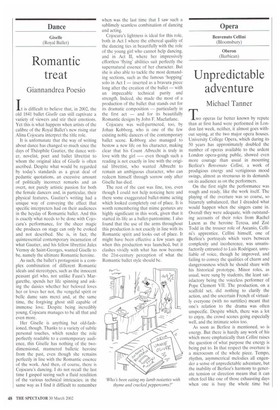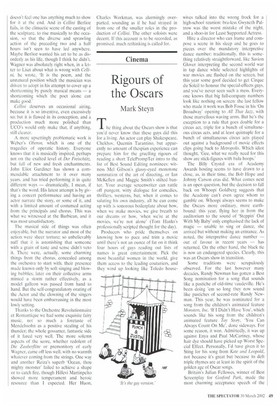Benvenuto Cellini (Bloomsbury) Oberon (Barbican)
Unpredictable adventure
Michael Tanner
Two operas far better known by repute than at first hand were performed in London last week, neither, it almost goes without saying, at the two major opera houses. University College Opera, which during its 50 years has approximately doubled the number of operas available to the ardent London opera-going public, showed even more courage than usual in mounting Berlioz's Benvenuto Cellini, a work of prodigious energy and vertiginous mood swings, almost as strenuous in its demands on its audience as on the performers.
On the first night the performance was rough and ready, like the work itself. The playing of the overture was so coarse, so bizarrely unbalanced, that I dreaded what would happen when the singers came in. Overall they were adequate, with outstanding accounts of their roles from Rachel Luxon as the heroine Teresa, and Zoe Todd in the trouser role of Ascanio, Cellini's apprentice. Cellini himself, one of Berlioz's portrayals which veers between complexity and incoherence, was unsatisfactorily entrusted to Luis Rodriguez, unreliable of voice, though he improved, and failing to convey the qualities of charm and dangerousness which he should share with his historical prototype. Minor roles, as usual, were sung by students, the least satisfactory being the voiceless performer of Pope Clement VII. The production, on a scaffold set, did nothing to clarify the action, and the uncertain French of virtually everyone (with no surtitles) meant that one's relation to the drama was often unspecific. Despite which, there was a lot to enjoy, the crowd scenes going especially well, and the intimate solos too.
As soon as Berlioz is mentioned, so is energy. But there is hardly any work of his which more emphatically than CAM raises the question of what purpose the energy is being put to. In that respect the overture is a microcosm of the whole piece. Tempo, rhythm, asymmetrical melodies all engender a sense of unpredictable adventure, but the inability of Berlioz's harmony to generate tension or direction means that it can often feel like one of those exhausting days when one is busy the whole time but
doesn't feel one has anything much to show for it at the end, And in Cellini Berlioz fails, in the climactic scene of the casting of the sculpture, to rise musically to the occasion, so that the diverse and sprawling action of the preceding two and a half hours isn't seen to have led anywhere. Maybe Berlioz wanted his art to be as disorderly as his life, though I think he didn't. Wagner was absolutely right when, in a letter to Liszt about what is wrong with Cellini, he wrote, 'It is the poem, and the unnatural position which the musician was driven to adopt in his attempt to cover up a shortcoming by purely musical means — a shortcoming which the poet alone can make good.'
Cellini deserves an occasional airing, because it is so inventive, even excessively so; but it is flawed in its conception, and a production much more polished than UCO's would only make that, if anything, still clearer.
A more upsettingly problematic work is Weber's Oberon, which is one of the tragedies of operatic history. Everyone knows that it is musically inspired, perhaps not on the exalted level of Der Freischiitz, but full of new and fresh enchantments. John Eliot Gardiner has shown a commendable attachment to it over many years, and has tried performing it in quite different ways — dramatically, I mean, if that's the word. His latest attempt is by giving a concert performance and having an actor narrate the story, or some of it, and with a limited amount of costumed acting from the principals and chorus. This was what we witnessed at the Barbican, and it was most unsatisfactory.
The musical side of things was often enjoyable, but the narrator and most of the action were sheer torture; so unbelievably naff that it is astonishing that someone with a grain of taste and sense didn't veto it. There were, actually, some charming things from the chorus, concealed among the orchestra to start with, their presence made known only by soft singing and blowing bubbles; later on their collective arms mimed a storm rather effectively, as a model galleon was passed from hand to hand. But the self-congratulatory orating of the Actor and the clowning of the singers would have been embarrassing in the most lowly setting.
Thanks to the Orchestre Revolutionnaire et Romantique we had some exquisite fairy music, not so much a foretaste of Mendelssohn as a positive stealing of his thunder; the whole gossamer, fantastic side of it fared very well. The more solemn aspects of the score, whether redolent of Die Zauberflote or premonitory of early Wagner, came off less well, with no warmth whatever coming from the strings. One way and another Reiza's superb 'Ocean, thou mighty monster' failed to achieve a shape or to catch fire, though Hillevi Martinpelto showed more temperament and heroic resource than I expected. Her Huon,
Charles Workman, was alarmingly overparted, sounding as if he had strayed in from one of the smaller roles in the production of Ce!Ifni. The other soloists were decent. If this account is to be recorded, as promised, much rethinking is called for.



































































 Previous page
Previous page